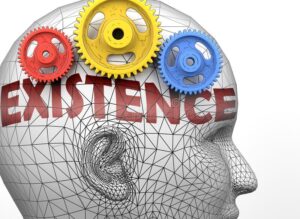Since a few years ago, I have started to design various different/independent deductive proofs for God’s existence. Some are a-priori proofs while others are a-posteriori proofs.
Around a year or more ago, I have designed the following version of ontological proof for God’s existence [yes, my original creative idea 🙂 ]. I have not encountered such a version before.
There are two stages in this Proof. Stage 1 leads to the conclusion that an “Unconditionally Existing Entity” exists as an extra-mental reality in addition to being an idea in our minds. Stage 2 would then show/demonstrate why there is one and only one entity that exists unconditionally, and why this entity is God.

Below is a summary of Stage 1.
1. Every entity without exception exists either conditionally or unconditionally; every entity’s existence is either conditional existence or unconditional existence.
2. An unconditionally existing entity (UEE) is an entity that exists unconditionally; its existence is unconditional existence.
3. There is no intrinsic contradiction in the idea of UEE because there is no contradiction between “unconditional” and “existence”, unlike the idea of a circular square in which being “circular” contradicts being a “square”.
4. It is impossible for a circular square to exists as an extra-mental reality due to the intrinsic contradiction in the idea “circular square”; at most it exists as a self-contradictory idea in our minds. This intrinsic condition of self-contradiction makes it impossible for a circular square to exist as an extra-mental reality.
[any idea or claim that entails a true contradiction is false; if an entity is being X, then it is impossible for that entity to be not-X in the same respect/sense at the same time from the same perspective.]
5. In contrast, it is POSSIBLE that UEE exists as an extra-mental reality in addition to being an idea in our minds because there is no intrinsic contradiction in the idea of UEE. There is no intrinsic condition or contradiction that makes it impossible for UEE to exist.
6. Given that it is POSSIBLE for UEE to exist as an extra-mental reality, UEE either exists or not exist outside our minds in the actual reality.
7. Is it POSSIBLE or IMPOSSIBLE that UEE does not exist as an extra-mental reality in addition to being an idea in our minds?
8. To answer the above question, let us temporary adopt the hypothetical assumption that “UEE does not exist as an extra-mental reality”.
9. If the above hypothetical assumption entailed a contradiction, then the above hypothetical assumption “UEE does not exist as an extra-mental reality” must be false. This would then mean it is IMPOSSIBLE that UEE does not exist as an extra-mental reality in addition to being an idea in our minds.
10. Under the above hypothetical assumption, UEE’s non-existence as an extra-mental reality can only be due to either the absence or presence of certain real-world conditions extrinsic to UEE, because as explained earlier (Points 3 to 5), there is no contradiction or condition intrinsic to UEE that makes it impossible for UEE to exist as an extra-mental reality.
11. In other words, under the above hypothetical assumption, UEE’s existence or non-existence is affected by conditions. Under the above hypothetical assumption, UEE does not exist unconditionally; UEE’s existence is not unconditional existence.
12. But from Point 2, UEE is an entity that exists unconditionally; from Point 2, UEE’s existence is unconditional existence.
13. Hence the above hypothetical assumption entailed the contradictory result that UEE is an entity that exists unconditionally (Point 2) and does not exist unconditionally (Point 11) at the same time; the above hypothetical assumption entailed the contradiction that UEE’s existence is and is not unconditional existence at the same time.
14. Thus the hypothetical assumption that “UEE does not exist as an extra-mental reality” is false (because that assumption entailed a contradiction). It is IMPOSSIBLE that UEE does not exist as an extra-mental reality.
Conclusion of Stage 1
15. Therefore an unconditionally existing entity (UEE) exists as an extra-mental reality in addition to being an idea in our minds.
One-sentence Summary
If it is POSSIBLE that UEE exists unconditionally, then it is IMPOSSIBLE that UEE does not exist as an extra-mental reality.
Reminder:
It is only in Stage 2 that I will demonstrate why there is one and only one entity that exists unconditionally, and why this entity is God.
